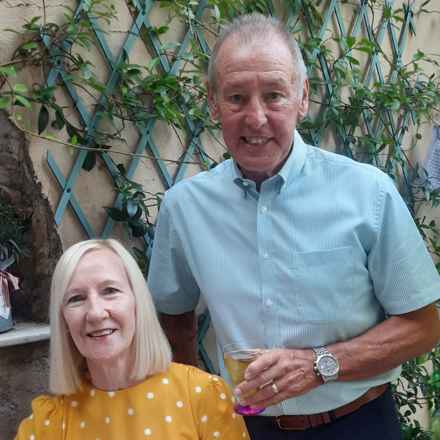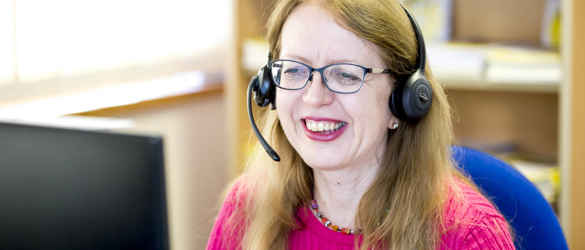“Talking to people who knew what macular was, I knew I wasn’t alone"
Posted: Tuesday 02 July 2024
When Peter was told he had macular degeneration, he found himself overwhelmed with uncertainty and fear. The rapid deterioration of his sight was far worse than he had imagined, and the lack of information and support he received left him feeling ‘abandoned’.
But, the 74-year-old explained how reaching out for support from the Macular Society, helped him come to terms with his new way life.
"I just was completely shocked,” he said. “Nobody explained to me that it could happen so quickly. In fact, the optician said to me that they’ve never seen anyone's eyes deteriorate as fast as mine.”
Unprepared for the reality of sight loss
Like many others Peter had never heard of macular degeneration before his diagnosis. He had attended a routine eye test expecting to get a new prescription. "I didn't understand why I couldn’t get new glasses?" He said.
"I didn’t know what macular degeneration was. I had to go home and look on the laptop, try and find out about it. I got to read a little bit, but I never got the implication of how serious it was."
As a result, he said he felt completely unprepared for the reality of his diagnosis. "They just gave me some leaflets and a small magnifying glass and I was told, 'off you go'."
Lack of independence
Peter, who had a successful career as an IT project manager, suddenly found his independence stripped away. "I felt in control of everything. I used to do everything on the computer. And the jobs around the house, as well as the other things I like doing. It just collapses so easily," he said.
He discussed the impact it had on his daily life as he was unable to help around the house.
He said: "I always did things around the house. I like to cook with my wife. We share the cooking, but I can't do anything like that now. I can't see enough. I'm dangerous with a knife in my hand. Your self-esteem is just wiped out for a period, and you have to try and adjust."
He added: "It also puts a real strain on your marriage. When I first got it, my wife didn't understand. After being so independent all my life, it was difficult for me to suddenly give up everything. But I couldn't do anything on my own.”
Reaching out for support
Eventually, the diagnosis took a toll on Peter’s mental health and he decided to reach out to the Macular Society. "I never envisaged it getting to this stage of sight loss,” he said. “It really set me back. And, for a few months, I didn't seek help. Eventually, I got so down, probably my lowest ebb, and I knew I needed to do something."
Peter picked up the phone and called the helpline. "My counsellor, May convinced me that I can’t just sit at home,” he said. “I’ve got to get up and do something, help myself. She changed my view on everything and gave me some advice," Peter said.
Seeing the light
Initially Peter was reluctant to seek counselling but admitted that it was exactly what he needed. "The counselling was really the thing that I didn't want to do. I thought I could sort myself out, but you obviously can't. And eventually, I saw the light.
“I decided that I had no other option, I must ask for some help and advice. The minute I started talking to people who knew what macular was about, I suddenly realised that there are people out there who can help me and advise me. And, you're not alone.”
He said: “I don't know where I would have been without the help. I dread to think my state of mind would be like, whereas now I'm a lot more positive.”
Peter admitted that his life had completely changed but the support from the Macular Society helped him adapt to his new reality. He said: “I've had to give a lot of things up. It's not easy. And for the first six months, I would say it's very difficult when it first comes around, because you just can't take it all in. I couldn't.
“I basically got through all of that because of the counselling that I was given through the Macular Society.”
Offering his advice to others facing a similar diagnosis, Peter said: "I think the biggest piece of advice I'd give anybody is, the minute you get a diagnosis, get help straight away. Get in touch with the Macular Society. The sooner you do it, the better. You'll feel better quicker if you do. Don’t do what I did and wait.”
Looking for support?
For information or advice call our helpline on 0300 3030 111 or email help@macularsociety.org
Macular Society Helpline
Free information and support to those with macular disease, along with their family and friends, to help people retain their independence.
Other support services
We provide free information and support to those with macular disease, along with their family and friends, to help people keep their independence.




